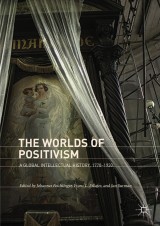Details

The Worlds of Positivism
A Global Intellectual History, 1770-1930|
128,39 € |
|
| Verlag: | Palgrave Macmillan |
| Format: | |
| Veröffentl.: | 25.01.2018 |
| ISBN/EAN: | 9783319657622 |
| Sprache: | englisch |
Dieses eBook enthält ein Wasserzeichen.
Beschreibungen
This book is the first to trace the origins and significance of positivism on a global scale. Taking their cues from Auguste Comte and John Stuart Mill, positivists pioneered a universal, experience-based culture of scientific inquiry for studying nature and society—a new science that would enlighten all of humankind. Positivists envisaged one world united by science, but their efforts spawned many. Uncovering these worlds of positivism, the volume ranges from India, the Ottoman Empire, and the Iberian Peninsula to Central Europe, Russia, and Brazil, examining positivism’s impact as one of the most far-reaching intellectual movements of the modern world. Positivists reinvented science, claiming it to be distinct from and superior to the humanities. They predicated political governance on their refashioned science of society, and as political activists, they sought and often failed to reconcile their universalism with the values of multiculturalism. Providing a genealogy of scientific governance that is sorely needed in an age of post-truth politics, this volume breaks new ground in the fields of intellectual and global history, the history of science, and philosophy.<p></p>
1. Introduction: Particularizing Positivism.- I. Empires of Positivism.- 2. Striking a Chord: The Reception of Comte's Positivism in Colonial India.- 3. Positivism, Revolution and History in Brazil.- 4. Positivism in the Late Ottoman Empire: The "Young Turks" as Mediators and Multipliers.- II. Positive Knowledge and the Making of Positivism.- 5. An Enlightened Path to Positivism? Reflections on the Institutionalization of Science in Bourbon Spain.- 6. Trading Epistemological Insults: "Positive Knowledge" and Natural Science in Germany, 1800–1850.- 7. The French Philosophical Crisis of the 1860s and the Invention of the "Positivist School".- III. The Liberal Politics of Science and Society.- 8. Habsburg Positivism: The Politics of Positive Knowledge in Imperial and Post-Imperial Austria, 1804–1938.- 9. The Contexts of Early Polish Positivisms, 1840s–1900s.- 10. Positivism in Late Tsarist Russia: Its Introduction, Penetration and Diffusion.- IV. Positivist Aftermath.- 11. Positivism in the Northern Peripheries: Generations of Positivist Philosophers in Sweden and Its Neighboring Countries.- 12. Dilthey and Carnap: The Feeling of Life, the Scientific Worldview, and the Elimination of Metaphysics.- 13. Epilogue: The Worlds of Positivism: An Analytical Synopsis.<p></p>
<div><div>Johannes Feichtinger is Senior Research Associate at the Austrian Academy of Sciences and Visiting Professor for modern history and the philosophy of science at the University of Vienna, Austria.</div><div><br></div><div>Franz L. Fillafer is Lecturer in modern and contemporary history at the University of Konstanz, Germany.</div><div><br></div><div>Jan Surman is Visiting Scholar at the Max Web Centre for Advanced Cultural and Social Studies, University of Erfurt, Germany.</div></div><div><br></div>
This book is the first to trace the origins and significance of positivism on a global scale. Taking their cues from Auguste Comte and John Stuart Mill, positivists pioneered a universal, experience-based culture of scientific inquiry for studying nature and society—a new science that would enlighten all of humankind. Positivists envisaged one world united by science, but their efforts spawned many. Uncovering these worlds of positivism, the volume ranges from India, the Ottoman Empire, and the Iberian Peninsula to Central Europe, Russia, and Brazil, examining positivism’s impact as one of the most far-reaching intellectual movements of the modern world. Positivists reinvented science, claiming it to be distinct from and superior to the humanities. They predicated political governance on their refashioned science of society, and as political activists, they sought and often failed to reconcile their universalism with the values of multiculturalism. Providing a genealogy of scientific governance that is sorely needed in an age of post-truth politics, this volume breaks new ground in the fields of intellectual and global history, the history of science, and philosophy.
Presents the first global history of positivism Explores the relationship between natural sciences and the humanities, science and religion, and universalism and cultural diversity on a global scale through Positivism’s culture of enquiry Provides a geneaology of scientific governance, with important social and ethical implications for today Appeals to scholars of intellectual history, global history, transnational history, sociology, and philosophy
Presents the first global history of positivism<p></p> <p>Explores the relationship between natural sciences and the humanities, science and religion, and universalism and cultural diversity on a global scale through Positivism’s culture of enquiry</p> <p>Provides a geneaology of scientific governance, with important social and ethical implications for today</p> <p>Appeals to scholars of intellectual history, global history, transnational history, sociology, and philosophy</p>
“This long-overdue collection represents the single best volume on positivism's remarkable influence throughout the world. The authors have done a stunning job of research and analysis. Every page brims with surprising revelations. I can't recommend this work highly enough.” (Mary Pickering, San José University, USA, author of Auguste Comte: An Intellectual Biography)<p></p>

















